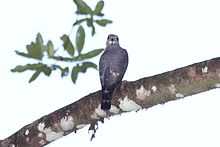Double-toothed Kite
| Double-toothed Kite | |
|---|---|
 | |
| Conservation status | |
| Scientific classification | |
| Kingdom: | Animalia |
| Phylum: | Chordata |
| Class: | Aves |
| Order: | Falconiformes (or Accipitriformes, q.v.) |
| Family: | Accipitridae |
| Genus: | Harpagus |
| Species: | H. bidentatus |
| Binomial name | |
| Harpagus bidentatus (Latham, 1790) | |
The Double-toothed Kite (Harpagus bidentatus) is a species of bird of prey in the Accipitridae family. It is found in Belize, Bolivia, Brazil, Colombia, Costa Rica, Ecuador, El Salvador, French Guiana, Guatemala, Guyana, Honduras, Mexico, Nicaragua, Panama, Peru, Suriname, Trinidad and Tobago, and Venezuela.[1]
This fairly small raptor is 33–38 cm (13–15 in) long and weighs 161-230 grams (5.7-8.2 oz.)[2] The kite's white rump patch is conspicuous in flight, making the double toothed kite one of the easiest Costa Rican raptors to identify.[3] The double toothed kite is a fairly common bird in the mid and low elevation forests of Central America.[3] Its natural habitats are subtropical or tropical moist lowland forests and subtropical or tropical moist montane forests.[1]
The double-toothed kite generally hunts from a perch above the rainforest floor. The kite dives quickly downward to catch lizards and insects, the principle staples of its diet.[4] The double toothed kite is an opportunistic hunter, often perching near groups of monkeys in order to capture prey flushed by the large mammals.[4]
Notes
- ↑ 1.0 1.1 1.2 BirdLife International (2012). "Harpagus bidentatus". IUCN Red List of Threatened Species. Version 2013.2. International Union for Conservation of Nature. Retrieved 26 November 2013.
- ↑ Double-toothed Kite.
- ↑ 3.0 3.1 Henderson, Carrol L. "Birds of Costa Rica." University of Texas Press, 2002 and 2010. pg 70
- ↑ 4.0 4.1 Asa Wright Nature Center. Double-toothed Kite
References
- Asa Wright Nature Center. http://www.birdsoftt.com/birds_info/double-toothed%20kite.htm
- Henderson, Carrol L. "Birds of Costa Rica." University of Texas Press, 2002 and 2010. pg 70.
